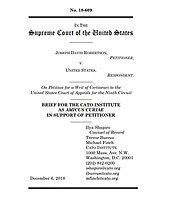Learn more about Cato’s Amicus Briefs Program.
Joseph Robertson dug ditches to collect water from a rivulet that ran through his private property. In the process some dirt got into the rivulet, which emptied into a local stream, which emptied into a state river, which entered a river that crossed state lines. The Army Corps of Engineers charged Robertson under the Clean Water Act (CWA) with criminal sanctions for failing to get a permit for the “dumping” of “dredge and fill” into interstate waters.
The Constitution’s Commerce Clause gives Congress the power to regulate interstate commerce, including channels of interstate commerce. Those channels include traditional interstate waterways, but the government argues it also includes all waters that may have a “significant nexus” to navigable waters, even those waters that only tangentially intercept actually navigable water. Mr. Robertson lost in the lower courts and he has petitioned the Supreme Court for review. He’s asking the Court to recognize that his ponds are neither remotely navigable nor interstate and to confine the government’s power to the text of the law and strictures of the Constitution. Cato has filed a brief in support of Mr. Robertson’s petition.
We argue that the government reads the definition of the term “waters of the United States” contrary to the Court’s prior decision in Rapanos v. United States. The plurality in Rapanos established that the “waters of the United States” may include non-navigable wetlands only where the channel at issue is adjacent to a water of the United States, and if the wetland has a continuous surface connection with that water, “making it difficult to determine where the ‘water’ ends and the ‘wetland’ begins.” That line-drawing problem is not present here. Several clearly identifiable waters separate Robertson’s ponds from the nearest navigable water. Under the plurality definition of “waters of the United States,” Robertson’s would be safe. However, the Rapanos Court didn’t have enough votes to solidify this plain reading of the law. The Court should finally affirm the plurality’s definition of “waters of the United States” because it better protects state and federal jurisdiction over their respective waters, gives clearer definition to “waters of the United States,” places the burden of proof on government for restricting private water use, and will resolve the current circuit split in favor of accountable legislative deliberation about the scope of the commerce power.



